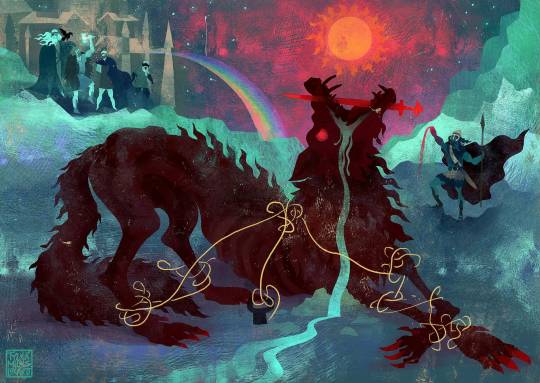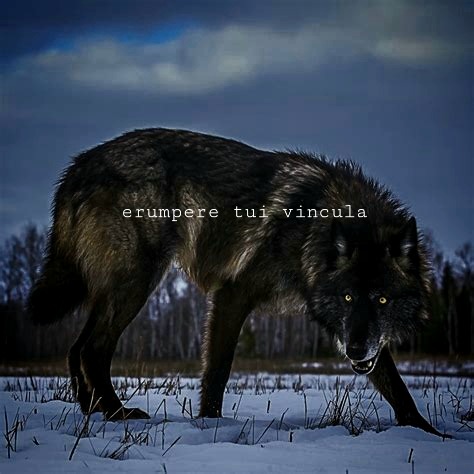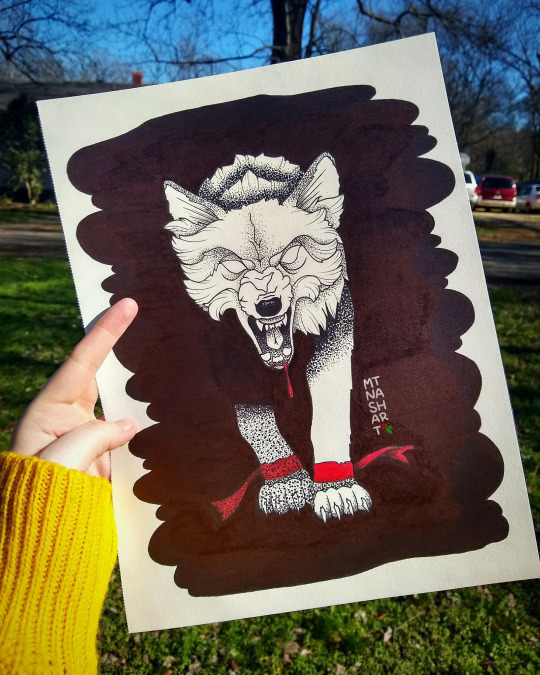Text

"The Binding of Fenrir" by Tyler Miles Lockett
2K notes
·
View notes
Text
No Hindrance

Break free of your bonds
Do not let anyone chain you down
Live selfishly
You were made to run wild
#break free of your bonds#fenrir#fenrir deity#fenris#fenris wolf#fenrisulfr#fenrisulfr deity#norse paganism#norse mythology#norse pagan#heathenry#heathen#rokkatru#rokkr
77 notes
·
View notes
Text
A Informational Dump on Fenrir

Names:
Fenrir (Fen-Dweller)
Fenris (Coming from "Fenrisúlfr")
Fenrisúlfr (Úlfr meaning Wolf, Fenrir's Wolf or Fenris-Wolf)
Vánagandr/Vanargand (Monster of the River Van)
Hróðvitnir (Fame-Wolf)
Appearance:
Fenris is said to appear as a Ginormous Wolf, with Black Gur and Red Eyes. However, for me personally, his fur appears as more of a darker greyish color. :)
Mythology:
All of these are going to be kept as short as I can, while still keeping them accurate and informational. (Low Energy for those who don't like to read as much or are having a hard day and out of spoons!)
Birth and Prophecy:
Fenrir was born to Loki and Angrboða, among of course, his other siblings. (Jördmungandr and Hel). The Æsir had heard of these births, along with the prophecies that came with them. Fenrir was to swallow Odin, the "Head Ruler" of the Æsir, and the other children to add their destruction with the bringing of Ragnarök; the End of Worlds. Now it would be obvious the Gods didn't like to hear about their own endings, so the effort was put in to try and hold off Ragnarök.
Jördmungandr was thrown into the deepest depths of the Ocean, curled around Midgard (Earth). Eventually he grew large enough to bite at his own tail, and the Ouroboros is a common symbol used to represent him.
Hel, Fenrir's other sibling, was set to rule Helheim, land of the Dead.
Meanwhile Fenrir himself was raised by the Æsir in hopes he would grow to favor the Gods. However as he grew larger and more ferocious, the Gods began to fear what he would become, and Fenrir was tricked into being bound in fetters (leg bindings).
The Binding of Fenrir:
At first, Fenrir was tricked into bindings, told by the Gods that it was a game, a test of his strength. He was first bound with Leyding, created by the Gods themselves. It was the strongest chains they had created, however Fenrir broke it with a single kick.
The Second Binds were known as Dromi, also made by the Gods, and twice as strong as before. Fenrir struggled a moment, but in under a minute he had broken free.
The Third and Final Binding was Gleipnir, which roughly translates to "Entangler" by most sources, though other sources have argued a few different translations.
Gleipnir was crafted by the Dwarves from 6 "impossibles" (The Sound of a Cat's Footfall, a Woman's Beard, the Spit of a Bird, Breath of a Fish, Roots of a Mountain, and Sinews of a Bear). Light and thin, Gleipnir appeared as merely a ribbon. However the Gods had sensed its power, and none of them had proven able to break it.
So from there Gleipnir was presented to Fenrir, with the Gods challenging that he could not break it, as none of them had been able to. Fenrir had scoffed, as ripping such a seemingly small thread would not be as impressive as thick chains.
However he sensed a trap, and agreed with caution to allow the ribbon to be tied around him as long as he had the assurance he was safe, which required the Gods to sacrifice their own safety as well. Tyr, (who had been feeding and caring for Fenrir as the Gods grew more and more fearful of him, and the one Fenrir trusted most) was the only one brave enough to volunteer. He placed his right hand into the jaws of Fenrir as the great wolf was tied.
Fenrir struggled and kicked, but the ribbon only tightened around him. The Gods mocked and laughed at Fenrir for being unable to break himself free. In the rage, Tyr lost his right arm to Fenrir, the sacrifice for binding the wolf.
Gleipnir was fastened to a large stone, which was then anchored to another, larger stone. A sword is then forced through Fenrir's jaws, keeping him trapped.
His children, Sköll (Sun Devourer) and Hati (Moon Devourer) were the only ones who attempted to free him. However the ribbon proved unbreakable, and the children were punished with chasing the Sun and Moon until Ragnarök, when the planets will be swallowed.
Location:
According to Myth, Fenrir is said to be bound on the Island "Lyngvi", in the Great Lake "Amsvartnir" (roughly translated to Pitch Black).
Personal communication with him sets more of a woodsy location, he is usually within a large circle of trees.
Things that Remind Me of Him:
The rush of adrenaline after doing something you're proud of
The burn in your muscles and lungs after a run or working out
The strength in standing up for yourself and defending what you believe
The smell of the Woods and safety of the darkness
Embracing the darker parts of yourself, whether it is simply to acknowledge them, or work on healing them
The rage associated with something being unfair or inequal
Rebelling against the "Norm"
Being unapologetically "You"
The Cyclical Events and Beginnings and Ends in life
The harsh heat of Flames
The scent of fresh-brewed coffee
Protection Magick
Caring your Mental and Physical Health
Putting yourself first in times of need (not selfishness, but times where you are needed to be put first)
Emotional Pain (Sorrow, Anger, etc. Offer it to Him too!!)
Dark Colors, Makeup, and Outfits
Bloodstone, Obsidian, Petrified Wood, Smokey Quartz, Tree Agate, Lapis Lazuli, Howlite, Hematite, Carnelian, Onyx, Black Moonstone, and Fossils (for my Crystal Focused Practitioners)
Mugwort, most types of Roots and Barks (White Willow, Oak, Birch, Burdock, etc), Yarrow, Yew Berries, Pine Needles, Turmeric, and other "Woodsy" Plants (for my Herb-Based Witches)
Parents and Siblings:
Fenris was born to the Jotuun Loki, the Trickster God, and the Jotuun Angrboða, Mother of Monsters. Along this were his Siblings, Jördmungandr the World Serphent, and Hel, Ruler of Helheim, the realm of the Dead (which is also a part of Niflheim).
Children: Sköll and Hati [Though some mythology speculates They and Fenrir are the same being(s)]
Disclaimer:
These retellings and translations are by my own words and own research, I cannot promise 100% accuracy on it all.
Please forgive any spelling or grammar issues, I am human and make mistakes. :)
#fenrir#fenrir deity#fenris#fenris wolf#fenrisulfr#fenrisulfr deity#norse mythology#norse pagan#norse paganism#heathenry#heathen#rokkatru#rokkr
1K notes
·
View notes
Text
Sorry that I've been absent for so long, school has been kicking my ass this year and I haven't really had time for anything but that. Because of that, I had to temporarily step away from the worship of my deities and working with them, but I missed it so so much.
So the other day, I did a simple rune reading with Fenrir. Nothing much, just to catch up and see what I should be focusing on, etc. I have never felt his presence more strongly it was honestly astounding. I won't say what exactly we went over, but I was tearing up by the end of it from just the comfort that was hearing him for the first time in a while.
On a separate note, I'm going to try to be more active moving forward because clearly I need it lol. I love you all, have a blessed day 🧡🖤
#my poor friend hearing me crying after that reading lmao i love him#fenrir#fenrir deity#fenris#fenris wolf#fenrisulfr#fenrisulfr deity#norse paganism#norse mythology#norse pagan#heathenry#heathen#rokkatru#rokkr
7 notes
·
View notes
Photo

art by Istrandar
#fenrir#fenris#fenris wolf#fenrisúlfr#fenrisulfr#norse#norse mythology#norse pagan#norse paganism#heathen#heathenry#art#the binding of fenrir#river van
604 notes
·
View notes
Text
Properties of Norse Paganism

Decentralized - Norse Paganism is practiced in many different ways, with no way being more correct than another. It doesn’t have holy books, scriptures, or key religious figures that guide practices and beliefs, nor does it have doctrines, creeds, or dogmas. This spirituality is dynamic and can be made to suit a practitioner’s needs.
Animistic - In Norse Paganism, all things are thought to have a unique spiritual essence to them, without separation between the sacred and the mundane. The divine is viewed as a property of existence, rather than a condition to achieve or a presence to earn. Because of this, there’s no such thing as “sin” in Norse Paganism.
Pluralist - Norse Paganism acknowledges that things can hold many truths and that there are many dynamic forces in nature. This is different from a dualist approach (the view that things are either a product of good or evil / one thing or another) or a monist approach (the belief that all things are an expression of one thing).
Polytheistic - Norse pagans acknowledge multiple deities and regularly interact with these deities in many ways, without a need for a mediator.
Orthopraxic - The focus of Norse Paganism centers upon the cultivation of practice and spiritual experience, as opposed to orthodoxy, or rules about what to believe and the intensity of one’s faith.
Life-Affirming - Norse pagans live their lives to feel fulfilled in this lifetime. Their practices are done to feel as home in the world, rather than reasons concerning the afterlife. While Norse pagans have many different views about the afterlife, good ones are already guaranteed.
2K notes
·
View notes
Text
To the Great Wolf
Hail to you Fame-Wolf,
He who was betrayed,
May we remember your faith
In those that betrayed you.
May we honor you
Wolf-Son of Loki,
Brother of Hel,
Father to the sun and moon chasers.
May we break our own bindings
The way you will break your own
When Ragnarok comes,
And may our rage match your own
When we face those
Who betray and bind us.
Hail to you, Fenrir!
#fenrir#fenris#fenrisulfr#Fenrisúlfr#fenris wolf#fenrirdeity#fenrirdevotee#norse#norse pagan#norse paganism#norse mythology#heathen#heathenry#rokkr#rokkatru#devotional poetry
123 notes
·
View notes
Text
Break Free
Break free from your bonds, He says
But do you listen?
When you face obstacles on your path
When someone holds you back
When your thoughts drag you down
Break free
However
It is hard to believe that you can
It is frightening to face what you fear
It is easier to look away and ignore his advice
But He is with you
He will eventually break free of his bonds
And so He knows what to do
He will give you the courage to face your fears
And He gives you the strength to break free of those holding you back
Break free of your bonds, He says
It will do you well to listen.
#fenrir#fenris#Fenrisúlfr#fenrisulfr#fenris wolf#fenrirdeity#fenrirdevotee#norse#norse pagan#norse paganism#norse mythology#heathen#heathenry#rokkr#rokkatru#devotional poetry#poetry#my poetry#break free
72 notes
·
View notes
Text
The Binding of Fenrir
But when the gods saw how much [Fenrir] grew every day, and when all prophecies declared that he was fated to be their destruction, then the Æsir seized upon this way of escape:
They made a very strong fetter, which they called Lædingr, and brought it before the Wolf, bidding him to try his strength against the fetter. The Wolf thought that no overwhelming odds, and let them do with him as they would. The first time the Wolf lashed out against it, the fetter broke; so he was loosed out of Lædingr.
After this, the Æsir made a second fetter, stronger by half, which they called Drómi, and bade the Wolf to try that fetter, saying that he would become very famous for his strength, if such huge workmanship should not suffice to hold him. But the Wolf thought that this fetter was very strong; he considered also that strength had increased in him since the time he broke Lædingr: it came into his mine, that he must expose himself to danger, if he would become famous. So he let the fetter be laid upon him. Now when the Æsir declared themselves ready, the Wolf shook himself, dashed the fetter against the earth and struggled fiercely with it, spurned against it, and broke the fetter, so that the fragments flew far away. So he dashed himself out of Drómi. Since then it passes as a proverb, "to loose out of Lædingr" or "to dash out of Drómi" when anything is exceedingly hard.
After that the Æsir feared that they should never be able to get the Wolf bound. Then Allfather sent him who is called Skírnir, Freyr's messenger, down into the region of the Black Elves, to certain dwarves, and caused to be made the fetter named Gleipnir. It was made of six things: the noise a cat makes in foot-fall, the beard of a woman, the roots of a rock, the sinews of a bear, the breath of a fish, and the spittle of a bird. And though thou understand not these matters already, yet now thou mayest speedily find certain proof herein, that no lie is told thee: thou must have seen that a woman has no beard, and no sound comes from the leap of a cat, and there are no roots under a rock; and by my troth, all that I have told thee is equally true, though there be some things which thou canst not put to the test."
Then said Gangleri: "This certainly I can perceive to be true: these things which thou hast taken for proof, I can see; but how was the fetter fashioned?" Hárr answered: "That I am well able to tell thee. The fetter was soft and smooth as a silken ribbon, but as sure and strong as thou shalt now hear. Then, when the fetter was brought to the Æsir, they thanked the messenger well for his errand. Then the Æsir went out upon the lake called Ámsvartnir, to the island called Lyngvi, and summoning the Wolf with them, they showed him the silken ribbon and bade him burst it, saying that it was somewhat stouter than appeared from its thickness. And each passed it to the others, and tested it with the strength of their hands and it did not snap; yet they said the Wolf could break it. Then the Wolf answered: 'Touching this matter of the ribbon, it seems to me that I shall get no glory of it, though I snap asunder so slender a band; but if it be made with cunning and wiles, then, though it seem little, that band shall never come upon my feet.' Then the Æsir answered that he could easily snap apart a slight silken band, he who had before broken great fetters of iron,--'but if thou shalt not be able to burst this band, then thou wilt not be able to frighten the gods; and then we shall unloose thee.' The Wolf said: 'If ye bind me so that I shall not get free again, then ye will act in such a way that it will be late ere I receive help from you; I am unwilling that this band should be laid upon me. Yet rather than that ye should impugn my courage, let some one of you lay his hand in my mouth, for a pledge that this is done in good faith.' Each of the Æsir looked at his neighbor, and none was willing to part with his hand, until Týr stretched out his right hand and laid it in the Wolf's mouth. But when the Wolf lashed out, the fetter became hardened; and the more he struggled against it, the tighter the band was. Then all laughed except Týr: he lost his hand.
When the Æsir saw that the Wolf was fully bound, they took the chain that was fast to the fetter, and which is called Gelgja, and passed it through a great rock - it is called Gjöll - and fixed the rock deep down into the earth. Then they took a great stone and drove it yet deeper into the earth - it was called Thviti - and used the stone for a fastening-pin. The Wolf gaped terribly, and thrashed about and strove to bite them; they thrust into his mouth a certain sword: the guards caught in his lower jaw, and the point in the upper; that is his gag. He howls hideously, and slaver runs out of his mouth: that is the river called Ván; there he lies till the Weird of the Gods." Then said Gangleri: 'Marvellous ill children did Loki beget, but all these brethren are of great might. Yet why did not the Æsir kill the Wolf, seeing they had expectation of evil from him?" Hárr answered: "So greatly did the gods esteem their holy place and sanctuary, that they would not stain it with the Wolf's blood; though (so say the prophecies) he shall be the slayer of Odin.
#fenrir#fenris#fenrisulfr#norse paganism#norse pagan#norse mythology#gylfaginning#heathenry#heathen#rokkatru#asatru#vanatru#the binding of fenrir
65 notes
·
View notes
Text
TRIGGER WARNING AHEAD
Fenrir, thank you so much for keeping me here tonight, for offering your comfort and support to me when I needed it most.
#one of the only things keeping me here right now is him#so thank you fenrir#fenrir#fenris#fenris wolf#fenrisulfr#fenrisúlfr#norse pagan#norse paganism#norse mythology#norse#heathen#heathenry#rokkatru#rokkr#tw: suicide#tw: suicidal thoughts#tw: self harm#tw: depression
17 notes
·
View notes
Text
Vánagandr (The Soul of Hope)
The Great Wolf lay there, howling in rage and humiliation as the laughter of the Aesir rang in his ears. Fenrir knew accepting to be bound with an obviously magic chain was a bad idea. So why had he done it?
Perhaps his pride was the answer: he couldn’t bear the shame of being mocked for fearing such a flimsy-looking gold ribbon. He’d staked his reputation on his courage and strength and that reputation was all he had to gain him respect among the accursed Aesir, wasn’t it? No, he knew he wasn’t that fragile or desirous of their company. He was better than them, wasn’t he? He snarled at them all. “ Of course I’m better than them,” he growled to himself. There was no question about that. Then why had he done it? His gaze settle on Tyr, the only other one whose sides didn’t shake with cruel mirth.
Perhaps it was him. No, not him, but the trust Fenrir had held in him, surely that was the answer. He was the only one who’d been straight with Fenrir, the only one with the courage to even be near him. Fenrir had come to trust him, that was his mistake. How could he have trusted one of them, the people who’d stolen him from his home, his family, and then shunned him as a monster? He strained harder against the slender golden band Gleipnir only to cause it to tighten further against his body, threatening to bite into his flesh if he dared to thrash much more.
But the bite of gleipnir further enraged the wolf. He howled abuse and slung curses at the surrounding Aesir.
“His whining is obnoxious. Shut him up,” one of them said. Fenrir thought it was Odin but he couldn’t be sure as the celebrations of the Aesir made it hard to hear clearly.
He prepared to hurl more curses when suddenly a sharp pain cut through his jaw. A sword was jammed into his maw, forcing his mouth permanently open and gagging him simultaneously as it pierced his tongue and held it in place. Fenrir jerked his head back and shook it in surprise and pain, spraying bloody slobber everywhere. Simultaneously disgusted by the foam and content that the binding was completed, the Aesir left to have their celebration far from Fenrir’s tormented thrashings. Fenrir watched as even Tyr left him to lay there alone and in agony.
Eventually his struggling ceased as he lay there exhausted and miserable. “This is it,” he thought, his mind clouded in despair and pain. He lay there, watching as slabber steadily poured forth from his now permanently agape jaws. The saliva was frothy and pink as it was mixed with blood. The sight of his saliva mixed with his blood transfixed the great wolf. Suddenly, something clicked in his head, lighting a fire that burned away his momentary self-pity and defeatist thoughts. His blood, his essence, mixed and became one with his saliva, a symbol of desire. His desires and his being were one now. He would wait, endlessly if he had to, for his moment to seize his desires: freedom and vengeance. He knew the time would come and when it came, he would be ready. Drool continued to ooze forth from his mouth, eventually running clear just like his purpose.
This great stream of saliva fell to Midgard, forming a new river. This river was named Ván which means hope. Hope stems from the great wolf lying in Asgard, waiting for his chance. Those who drink from hope are imbued with the wolf’s determination and strength, lighting the way with fire. Hope is not a promise that it will be easy as true hope only came from blood and pain; it is a promise that despite the darkness you will come through and seize your prey like Fenrir one day will seize his.
( @jackallordofthewest requested I write a myth snippet of the formation of the River Ván. I hope I did alright.)
#fenrir#fenris#fenrisúlfr#fenrisulfr#fenris wolf#river van#river ván#norse pagan#norse paganism#norse mythology#norse#heathen#heathenry#rokkatru#rokkr#rökkatru#tw: blood#tw: graphic
141 notes
·
View notes
Text
Working with Fenrir is not all rage and retribution. Remember that Fenrir is patron to the downtrodden and those enslaved by circumstance and oppression. If you want a way to honor Fenrir: Donate to lgbt shelters, spread awareness about those falsely convicted, and spread resources and encouragement for those in abusive situations. It is inevitable that Fenrir will break his chains, but our fellow humans may need some encouragement along the same path
#fenrir#fenris#fenris wolf#fenrisulfr#fenrisúlfr#norse pagan#norse paganism#norse mythology#norse#heathen#heathenry#rokkatru#rokkr#rökkatru
240 notes
·
View notes
Photo

Norse Mythology November, Day 22: Fenrir (Fenris Wolf, Fenrisúlfr)
#fenrir#fenris wolf#fenris#fenrisulfr#fenrisúlfr#norse pagan#norse paganism#norse mythology#norse#heathen#heathenry#rokkatru#rokkr#rökkatru
28 notes
·
View notes
Photo

bite the hand that beats you
#fenrir#fenris#fenrisulfr#fenrisúlfr#norse pagan#norse paganism#norse mythology#norse#heathenry#heathen#rokkatru#rökkatru#rokkr
51 notes
·
View notes
Text
Fenrir howls terribly
before the doors of Hel;
the wolf will break it's bonds and run.
- The Poetic Edda, Voluspa, Stanza 43
#fenrir#fenris#fenrisulfr#fenrisúlfr#norse pagan#norse paganism#norse mythology#norse#heathenry#heathen#rokkatru#rökkatru
297 notes
·
View notes
Text
Small Devotional Acts to Fenrir

Don’t let anything hold you back.
Be tenacious in your everyday life.
Leave offerings of meat and bone for Him.
Break the bonds that keep you from expressing yourself.
Do not allow your sorrows to devour you.
Allow yourself to enjoy solitude.
Trust others, but do so with reserve.
Express yourself in His honour; create poetry, art and music.
Embrace your anger, but do not let it consume you.
Burn earthy scented incense like sandalwood and patchouli.
Forgive but never forget.
Know your strengths and build upon your weaknesses.
Dress yourself in blacks, tans and other earthy tones.
Have a deep respect for all - even those who have wronged you.
Honour not only Fenrir, but his family as well.
Keep your word no matter what.
Pick your battles wisely and fight for what truly matters.
Recognize that nothing in life is purely black and white. Existence in and of itself is a grey area
Stand up for those who have been taken advantage of.
Fill your space with pelts, dark colours and bone. Perhaps devote it to Him.
Learn to love the endings, for they are just the beginning.
#daily devotion#devotion#fenrir#fenris#fenrisulfr#fenrisúlfr#norse pagan#norse paganism#norse mythology#norse#heathenry#heathen#rokkatru#rökkatru
1K notes
·
View notes
Text
May Fenrir give you the strength to seek justice 🐺✨
#fenrir#fenris#fenrisúlfr#fenrisulfr#norse pagan#norse paganism#norse mythology#norse#heathen#heathenry#rokkatru#rökkatru
217 notes
·
View notes